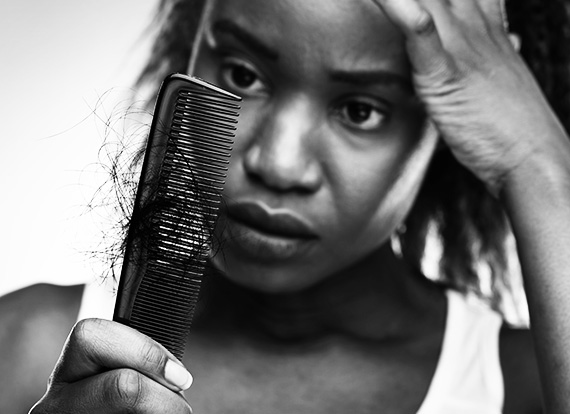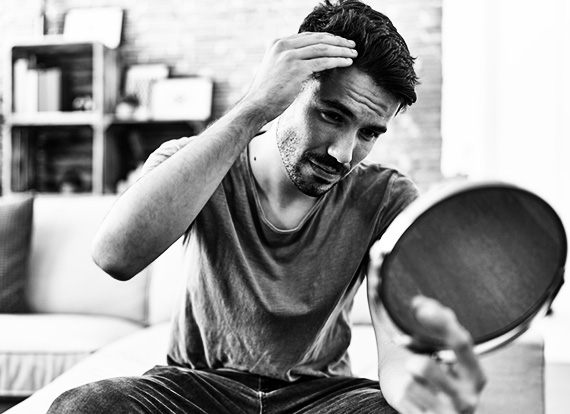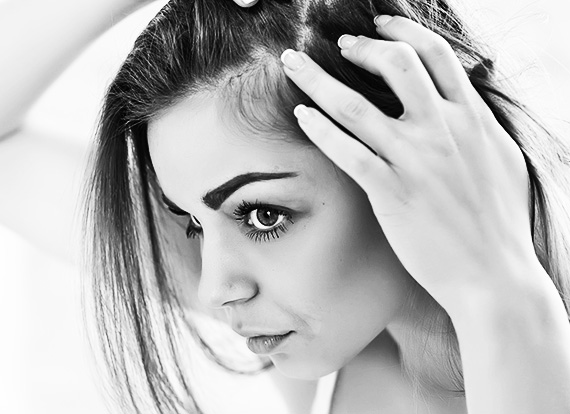What to do at the first signs of hair loss
Have you noticed your hair thinning or falling out as you’ve aged? Are you feeling overwhelmed, scared, or distressed by your thinning or balding scalp? Your feelings are valid, but don’t lose hope! There are quite a few options available to improve the health of your hair, or at least help keep your scalp looking and feeling its best.
Hair loss, commonly known as “balding” or “alopecia”, is the loss of hair from your body and head. The severity of hair loss can vary from person to person, but the reality is that hair loss is a real concern for many people.
Wikipedia describes the common types of hair loss as: “male- or female-pattern hair loss, alopecia areata, and a thinning of hair known as telogen effluvium. The cause of male-pattern hair loss is a combination of genetics and male hormones; the cause of female-pattern hair loss is unclear; the cause of alopecia areata is autoimmune, and the cause of telogen effluvium is typically a physically or psychologically stressful event. Telogen effluvium is very common following pregnancy.”
Oftentimes, hair loss is simply hereditary. Some individuals prefer to let the hair loss run its course, while others may cover it up with hairstyles, makeup, hats, or scarves. And still, others choose one of the treatments available to prevent further hair loss or restore growth.
Before pursuing hair loss treatment, talk with your doctor about the cause of your hair loss and treatment options.
Hair Loss Symptoms
The Mayo Clinic describes the symptoms of hair loss as:
- Gradual thinning on top of the head. This is the most common type of hair loss, affecting people as they age. In men, hair often begins to recede at the hairline on the forehead. Women typically have a broadening of the part in their hair. An increasingly common hair loss pattern in older women is a receding hairline (frontal fibrosing alopecia).
- Circular or patchy bald spots. Some people lose hair in circular or patchy bald spots on the scalp, beard, or eyebrows. Your skin may become itchy or painful before the hair falls out.
- Sudden loosening of hair. A physical or emotional shock can cause hair to loosen. Handfuls of hair may come out when combing or washing your hair or even after gentle tugging. This type of hair loss usually causes overall hair thinning but is temporary.
- Full-body hair loss. Some conditions and medical treatments, such as chemotherapy for cancer, can result in the loss of hair all over your body. The hair usually grows back.
- Patches of scaling that spread over the scalp. This is a sign of ringworm. It may be accompanied by broken hair, redness, swelling, and sometimes oozing.
If you experience any of these symptoms, consult with your doctor. Then make an appointment with your hair care specialist. It’s our goal to help you look your best and consult you through your options.
Hair Loss Causes
There are 6 main causes of hair loss. Although some are more severe than others, some causes are reversible.
- Genetics – The most common cause of hair loss is called androgenic alopecia, easily understood as male-pattern baldness and female-pattern baldness. It typically happens as you age in gradual and predictable patterns. Hair loss is most commonly identified as a receding hairline and bald spots in men and thinning hair along the crown of the scalp in women.
- Hormonal changes and/or medical conditions – Permanent or temporary hair loss can result from several circumstances. The moments include hormonal changes brought on by pregnancy, childbirth, menopause, and thyroid issues. Alopecia areata, an immune system-related syndrome that results in patchy hair loss is another cause. Lastly, conditions such as ringworm infections of the scalp, and the hair-pulling disorder trichotillomania also contribute to a thinning scalp.
- Medications and supplements – you are what you eat and your diet plays a huge role in the health of your hair. Some medications and supplements come with side effects that contribute to hair loss. If you notice a correlation between the two, consult your physician.
- Radiation – This is a sad reality for many, but true. Common treatments for severe medical conditions can permanently affect the health of your hair and scalp.
- Stress – that’s right, stress. Many people notice general hair thinning several months following a traumatic event, whether it be physical or emotional. Hair loss from an event of this nature is usually temporary.
- Your hair care routine – Excessive styling and tight-pulling hairstyles like pigtails and cornrows can result in traction alopecia, a type of hair loss. Permanent hair dye and hot oil treatments can both make hair brittle and fall out. Scarring could cause hair loss to become permanent. Overwashing your hair can strip your follicles of the oils it needs to protect your scalp. If you can rule out all other causes, book an appointment with us and we can assist you with your hair care options.
Other risk factors include a history of baldness on your mother’s or father’s side of the family, age, weight loss, specific medical disorders, stress, and poor nutrition.
Hair Loss Prevention
Sadly, genetics is the most common cause of balding. It is impossible to stop this kind of hair loss. However, hair loss is preventable in some cases by following these recommendations:
- Handle your hair with care. When brushing and combing your hair, use a detangler and try not to pull on it, especially if it’s wet. A wide-toothed comb could aid in preventing hair loss. Do not subject your hair to severe treatments like hot rollers, curling irons, hot-oil treatments, or permanents. Reduce the tension on your hair caused by braids, rubber bands, and barrettes.
- Consult your doctor if you are using any drugs or supplements that could be causing hair loss. Your doctor also may prescribe you a treatment that can help your hair’s health.
- Avoid exposing your hair to UV rays from the sun and other sources.
- Give up smoking. There is a link between smoking and baldness.
- Reduce your stress levels and eat a well-balanced diet. Finding ways to reduce your stress can provide your body with the energy it needs to keep your hair healthy. Your diet is just as important. The best vitamins for hair health/growth are:
- Vitamin B
- Biotin
- Vitamin C
- Iron
- Keratin
- Vitamin D
- Zinc
- Vitamin A.
Conclusion
It’s estimated that hair loss affects over 80 million Americans each year. Even though hair loss is so common, it is vastly under-discussed. At Parlor on Tremont, we’ve helped many clients navigate their hair loss while providing them with hair care options, products, and recommendations that keep them looking and feeling their best. Lower your stress levels and allow our team of hair care specialists to boost your confidence. Book a visit today!
Author: Marc Anthony Lujares
Published: November 7th, 2022







